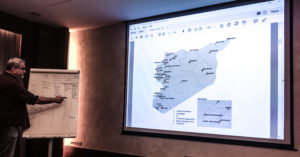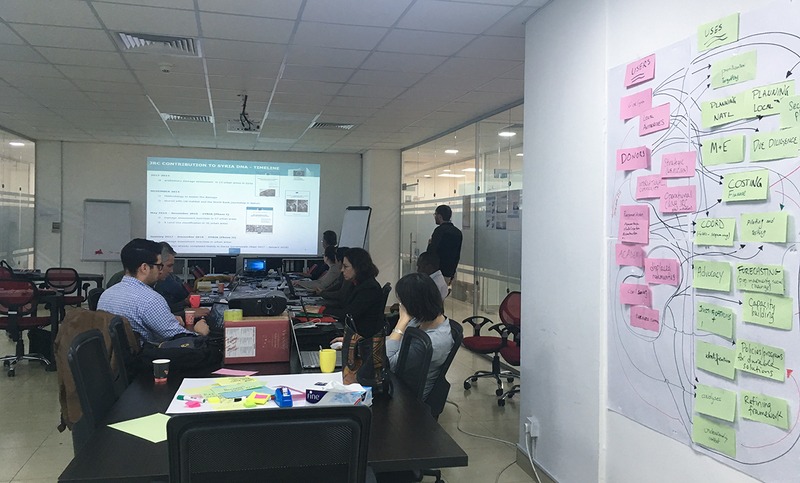With more than 7.6 million internally displaced people, 85 percent of which living in host communities mainly in urban areas, the conflict in Syria has produced a huge, predominantly urban crisis.
In line with our strategic goals of developing methods for urban profiling, in the past months we have been involved in the Urban Analysis Network Syria (UrbAN-S) project, looking to provide up-to-date and holistic analyses of critically-affected cities in Syria. This collaborative initiative brings together information on the displacement context, the functionality of the city in light of often heavy damage, and the needs of both displaced and host populations. The ultimate aim is to establish criteria for identifying priority intervention areas for recovery planning through a joint analysis with operational partners.
The UrbAN-S project adopts a holistic, area-based approach, aimed to provide data useful to both humanitarian and development initiatives thereby strengthening the links between them. The framework used incorporates information to measure progress of internally displaced populations towards achieving durable solutions, to assess the effect of conflict on peace-building and stabilisation, and to identify the ways in which a city is and is not functioning to meet the needs of its populations. The expected direct impact is being able to provide operational actors with the required tools, approaches and expertise to inform and improve planning and response in Syrian cities.

The UrbAN-S is a Consortium, built as a collaboration among iMMAP, the European Commission Joint Research Centre (JRC), Mercy Corps’ Humanitarian Access Team (HAT) and, of course, JIPS. All these organisations bring their specific –and strong- expertise in urban analysis, information management, damage assessments, displacement and conflict analyses, and collaborative and inclusive approaches, to create a methodology to better understand the reality on the ground than any one organisation could achieve alone. Additionally, the urban profiling toolkit will also draw from lessons shared by UN-Habitat on city and neighbourhood profiling methodologies implemented at the regional and global level.
As JIPS, we are leading the development of an Urban Profiling Toolkit, which will bring together various methodologies required for a holistic and area-based analysis of a city’s functionality and create the basis for joint analyses at the city-level. We are also focusing on capacity building, and will develop an Urban Profiling Training and design training materials to fit local needs.

Partners gathered together in Amman in March to kickstart the project and identify information needs of the many different types of operational partners on the ground. Members of the UrbAN-S also took part to the 9th World Urban Forum, in order to learn more from similar urban contexts and to raise awareness on the Urban Profiling Toolkit.
In May, we organised and facilitated a methodology workshop in Beirut, inviting all members of the Consortium and technical partners such as Common Space Initiatives and the World Bank.
The workshop focused on indicators: a variety of sources were reviewed (including the World Bank’s Damage Needs Assessments, the Durable Solutions Indicator Library, the SDGs, the HAT conflict analysis approach in urban areas, UN-Habitat City Prosperity Index and Governance Index) in order to develop a preliminary list of indicators to operationalise the analytical framework.
The methodology workshop was also the occasion for partners to refine and endorse the Analytical Framework for Urban Recovery.
This combines a preliminary context analysis with information collected along five “urban pillars” from the perspective of the populations and the city service providers, in order to produce contextualised and holistic information on urban conditions. These conditions will be analysed by area and by specific population groups to identify the gaps in service provision and meet the population’s needs.
The overall aim is to answer three key questions:
In the next months, JIPS will work to finalise the methodology, in light of the endorsed Analytical Framework for Urban Recovery and analysis plan. This document will include the objectives and intended use of the analysis, a description of the analytical framework, definition of geographic scope and target populations, and primary and secondary data collection methods to be used. These materials are intended to guide the data collection during the first pilot exercises, and will be updated as new lessons are learned. The methodology and accompanying tools for data collection will eventually be finalised for publication in the Urban Profiling Toolkit.
JIPS will also work to develop the process for joint analysis to enable a holistic and collaborative area-based analysis of the urban information. This joint analysis process will feature strongly in the methodology and later in the Urban Profiling Training.